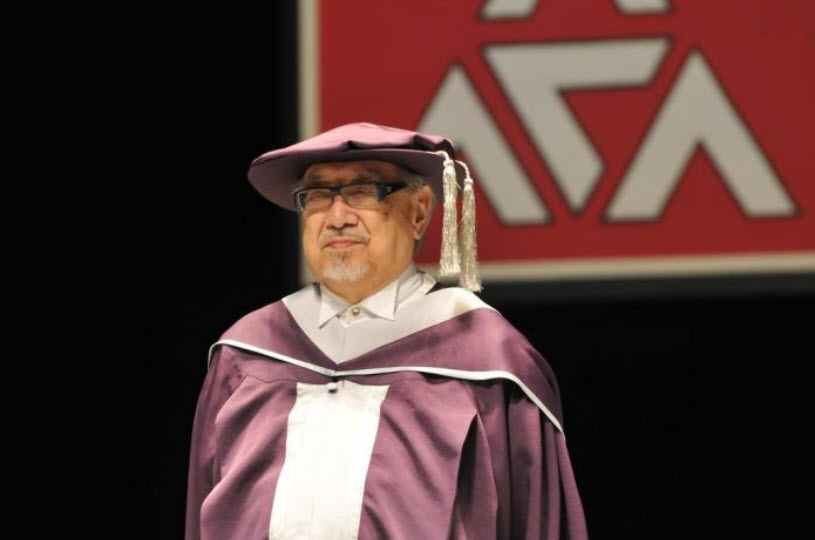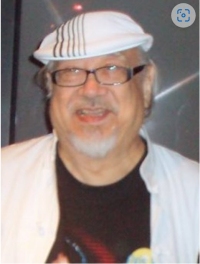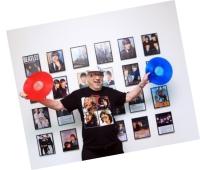Ray Cordeiro
Article by Daniel Gomes first published in the UMA Bulletin Fall 2012 and republished in Casa Newsletter Volume 35 Issue 1 March 2023
Reinaldo Maria Cordeiro MBE SBS was born on 12 December 1924 and died on 13 January 2023 aged 98. Known professionally as”Uncle Ray”, Ray was a Hong Kong broadcaster, disc jockey and actor. He was known for hosting All the Way with Ray on RTHK Radio 3 from 1970 to 2021, which was the longest-running radio programme in Hong Kong. In 200, he was named by the Guinness Book of World Records “The World’s Most Durable DJ”.
Uncle Ray was born in Wan Chai – one of six siblings and was of Portuguese descent of immigrants to China with his paternal grandfather being born in Shanghai and met his grandmother in the Portuguese Colony of Macau before moving to Hong Kong in the 1800″s.. Ray’s father was born in Hong Kong while his mother immigrated from Macau to Hong Kong in the early 20th century. When Cordeiro was six, his father abandoned the family and his mother was left to raise the family, taking on extra work to care for them. The family lived in poverty.
Cordeiro attended St Francis’ Canossian School as a child.
During World War II, his mother and sisters moved to Macau while Ray stayed in Hong Kong with his father who happened to work with HSBC. In 1943 Ray joined the rest of the family in Macau and lived in a refugee camp. At a New Year’s Eve in 1944, a “big band” performed at the camp and sparked his interest in the drums. It is also interesting to note that in his younger years, Ray had a stutter which he overcame with the help of his mother.
When the war ended, Ray worked for a time as a warden in Stanley Prison. When he left the job after refusing to help a prisoner he befriended to escape, he then went to work at HSBC. He also moonlighted as a drummer at that time, but he had “four boring years”at the bank.
His radio career started at age 25, when his broadcasting career began as a scriptwriter with Radio Rediffusion. Who doesn’t remember redifussion!!! Ha Ha. He then joined Radio Television Hong Kong (then known as Radio Hong Kong). His radio series “All the way with Ray” ran for 51 years and he also featured in cameo roles in various Hong Kong Films in the 70’s and 80’s.
Although never having interviewed Elvis Presley, he was recognised by Elvis Presley Enterprises for his lifelong contribution to Elvis. Many other artists were interviewed in his career but not Elvis. Queen Elizabeth II awarded Ray and MBE in Buckingham Palace in 1987. An honorary fellowship from the Hong Kong Academy of Performance Arts was awarded to him in 2012, as well as an honorary doctorate of Social Science from the Chinese University of Hong Kong in 2022. Cordeiro was honored with Hong Kong’s Silver Bauhinia Star in 2022.RTHK presented Cordeiro with a lifetime achievement award in 1997.
Ray’s late night show featuring radio classics and nostalgia, All the Way with Ray was listened to by many taxi drivers. This late night show “taught taxi drivers their English”. Some callers regarded his show as a chance to practice conversational English and he often helped them with their pronunciation.
The Hong Kong diaspora in Vancouver and Sydney tuned in to link with their other home and also helped Filipinos in Hong Kong feel a little less homesick. For decades this was a fixture for Uncle Ray from 10pm to 2am. Peoples request on the show would see him dash off to the library to find them, then came along CD’s and MP3 with which he was helped in later years by his godson Andy Chow.
Besides playing records, he hosted live music shows like “Lucky Dip,” on which local singers took audience requests. They mostly sang covers of Western hits, which had more cachet in Hong Kong in those days. But some of his guests – notably Roman Tam and Sam Hui – went on to be major Cantopop stars.
He would always start his show with Elvis Presley, and as midnight neared, he would move further back in time, to the likes of Steve Lawrence and Doris Day.
Here is some information from when Daniel Gomes of UMA, California USA interviewed Ray in 2012. These are excerpts from an article which appeared in an UMA newsletter published in 2012.
“He (Uncle Ray) also introduced many young musical talents to the Hong Kong Music scene”.
“As a teenager Ray was attracted to the drums, and found plenty of opportunities to practice on the cooking pots and pans in the kitchen at the refugee centre in Macau, where hismother was the head cook.”
“After the war, Ray worked for 4 years at the legendary Hongkong & Shanghai Banking Corporation and moonlighted as a drummer with his own jazz trio at the Chantecler Restaurant, near Hillwood Road, in Tsim Sha Tsui.”
(Ray said) “and they let me host The Diamond Music Show (weekly) sponsored by Ren da Silva, and The Shriro Hit Parade, the top 10 hits of the week.”
“After I became famous as a DJ, I was allowed to take charge of two popular live shows, Talent Time and Rumpus Time.”
“Both shows featured live performances in front of live audiences. Ray used these two shows to find and launch new musical talent. That was more than half a century before America’s Got Talent. A few who performed for Ray became famous. Terry Parsons showcased his fabulous voice and won so often that Ray offered him his own one-off show, on the condition that he would not take part in Forces Talent Show again. He accepted the offer and, on June 27, 1953, performed his first concert on air. Two songs from that show are featured in the Matt Monro Special Reserve Collection, recently released in Britain. Terry Parsons was Matt’s real name, and he was in Hong Kong for a two year stint in the military. He loved Hong Kong and remembered his good days there and came to my show whenever he was in town.”
“Rumpus Time produced The Fabulous Echoes, a pop group made up of young Filipino men that became a sensation in Hawaii for 25 years under the name Society of Seven, aka SOS. They were the first and, arguably, then most successful pop group from Hong Kong. “Rumpus Time” and “Talent Time” with audiences were both Rediffusion presentations but later transferred to Rediffusion Television when TV was introduced in Hong Kong. In 1960 Ray joined Radio Hong Kong, following the expiration of Rediffusion’s 10-year broadcasting franchise. It was there that some iconic musical figures made their debut, such as Joe Junior, Teddy Robin, the Playboys, Roman and The Four Steps. “Teddy Robin came in one day with an open-wheel recording of the hit Six Days in May. It was home-made and the quality was poor. Ray suggested Robin do a proper recording at the RHK studio, which he took to Ren da Silva owner of Diamond Records. Teddy Robin was given a recording contract and Ray went on to produce the song”. “[Joe Junior’s] father, Rodrigues SR, was my friend at St Joseph’s. One day he said to me, ‘My crazy son wants to be a pop singer, and you as a DJ, can you help?’ So I recommended him to Diamond Records, which ended up signing him and producing his first hit, Here’s a Heart, a song that was No. 1 for seven weeks. I must say Joe’s popularity was because he was naturally friendly with teenagers. After every show, no matter how late it was, he would stay until the last [fan] left. That’s why he has a lot of loyal fans over the years.” All the Way with Ray has been Ray’s longest-running radio program to date. Its launch owed much to the 1970 Osaka Expo.”
(Ray said: “I was selected as the road manager of a local pop group to perform at the Hong Kong pavilion, which was next to the British site. I picked Joe Junior, Irene Ryder, Michael Remedios and other top musicians from Hong Kong.
“We are proud of you, one of the shining Stars of our community.”

Ray Cordeiro
Artigo de Daniel Gomes publicado pela primeira vez no Boletim UMA Outono 2012 e republicado na Casa Newsletter Volume 35 Edição 1 de março de 2023
Reinaldo Maria Cordeiro MBE SBS nasceu em 12 de dezembro de 1924 e morreu em 13 de janeiro de 2023, com 98 anos. Conhecido profissionalmente como “Tio Ray”, Ray era um radialista de Hong Kong, disc jockey e ator. Ele era conhecido por apresentar All the Way with Ray na RTHK Radio 3 de 1970 a 2021, que foi o programa de rádio mais antigo em Hong Kong. Em 200, ele foi nomeado pelo Guinness Book of World Record “The World’s Most Durable DJ”.
O tio Ray nasceu em Wan Chai – um dos seis irmãos e era de ascendência portuguesa de imigrantes para a China com o seu avô paterno nascido em Xangai e conheceu a sua avó na Colônia Portuguesa de Macau antes de se mudar para Hong Kong em 1800. O pai de Ray nasceu em Hong Kong, enquanto sua mãe imigrava de Macau para Hong Kong no início do século 20. Quando Cordeiro tinha seis anos, seu pai abandonou a família e sua mãe foi deixada para criar a família, assumindo trabalho extra para cuidar deles. A família vivia na pobreza.
Cordeiro frequentou a Escola Canossiana de São Francisco quando criança.
Durante a Segunda Guerra Mundial, sua mãe e suas irmãs se mudaram para Macau, enquanto Ray ficou em Hong Kong com seu pai, que trabalhava com o HSBC. Em 1943, Ray juntou-se ao resto da família em Macau e viveu em um campo de refugiados. Em uma véspera de Ano Novo em 1944, uma “big band” se apresentou no acampamento e despertou seu interesse pela bateria. Também é interessante notar que, em seus anos mais jovens, Ray tinha uma gagueira que ele superou com a ajuda de sua mãe.
Quando a guerra terminou, Ray trabalhou por um tempo como diretor na prisão de Stanley. Quando ele deixou o trabalho depois de se recusar a ajudar um prisioneiro que ele fez amizade para escapar, ele então foi trabalhar no HSBC. Ele também trabalhou como baterista na época, mas ele tinha “quatro anos chatos” no banco.
Sua carreira no rádio começou aos 25 anos, quando sua carreira de radiodifusão começou como roteirista na Rádio Rediffusion. Quem não se lembra da redifusão!!! O Ha Ha. Ele então se juntou à Rádio Televisão Hong Kong (então conhecida como Radio Hong Kong). Sua série de rádio “All the way with Ray” durou 51 anos e ele também participou de participações especiais em vários filmes de Hong Kong nos anos 70 e 80.
Apesar de nunca ter entrevistado Elvis Presley, ele foi reconhecido pela Elvis Presley Enterprises por sua contribuição ao longo da vida para Elvis. Muitos outros artistas foram entrevistados em sua carreira, mas não Elvis. A rainha Elizabeth II concedeu Ray e MBE no Palácio de Buckingham em 1987. Uma bolsa honorária da Academia de Artes Performance de Hong Kong foi concedida a ele em 2012, bem como um doutorado honorário de Ciências Sociais da Universidade Chinesa de Hong Kong em 2022. Cordeiro foi homenageado com a Silver Bauhinia Star de Hong Kong em 2022. A RTHK apresentou ao Cordeiro um prémio de realização vitalícia em 1997.
O programa noturno de Ray com clássicos de rádio e nostalgia, All the Way with Ray foi ouvido por muitos taxistas. Este show noturno “ensinou os taxistas seus ingleses”. Alguns interlocutores consideraram seu show como uma chance de praticar inglês conversacional e ele muitas vezes os ajudou com sua pronúncia.
A diáspora de Hong Kong em Vancouver e Sydney sintonizaram para se conectar com sua outra casa e também ajudaram os filipinos em Hong Kong a sentirem um pouco menos saudades de casa. Durante décadas, este foi um acessório para o Tio Ray das 22h às 2h. O pedido do povo no programa o veria correr para a biblioteca para encontrá-los, depois veio CDs e MP3 com os quais ele foi ajudado nos últimos anos por seu afilhado Andy Chow.
Além de tocar discos, ele apresentou shows de música ao vivo como “Lucky Dip”, no qual os cantores locais aceitaram pedidos de audiência. Eles cantavam principalmente covers de sucessos ocidentais, que tinham mais prestígio em Hong Kong naqueles dias. Mas alguns de seus convidados – notavelmente Roman Tam e Sam Hui – passaram a ser grandes estrelas do Cantopop.
Ele sempre começava seu show com Elvis Presley, e à medida que a meia-noite se aproximava, ele se movia mais para trás no tempo, para os gostos de Steve Lawrence e Doris Day.
Aqui estão algumas informações de quando Daniel Gomes, da UMA, Califórnia, entrevistou Ray em 2012. Estes são trechos de um artigo que apareceu em um boletim da UMA publicado em 2012.
“Ele (Tio Ray) também introduziu muitos jovens talentos musicais para a cena da música de Hong Kong”.
“Quando um adolescente, Ray foi atraído pelos tambores, e encontrou muitas oportunidades para praticar nas panelas e frigideiras na cozinha no centro de refugiados de Macau, onde a mãe era a cozinheira da cabeça.”
Depois da guerra, Ray trabalhou por 4 anos na lendária Hongkong & Shanghai Banking Corporation e trabalhou como baterista com seu próprio trio de jazz no Chantecler Restaurant, perto de Hillwood Road, em Tsim Sha Tsui.
(Ray disse) “e eles me deixaram apresentar o The Diamond Music Show (semanalmente) patrocinado por Ren da Silva, e The Shriro Hit Parade, os 10 melhores hits da semana.”
“Depois que eu me tornei famoso como DJ, eu fui autorizado a assumir o comando de dois shows populares ao vivo, Talent Time e Rumpus Time.”
Ambos os shows apresentaram performances ao vivo na frente do público ao vivo. Ray usou esses dois shows para encontrar e lançar novos talentos musicais. Isso foi mais de meio século antes do America’s Got Talent. Alguns que se apresentaram para Ray ficaram famosos. Terry Parsons mostrou sua voz fabulosa e ganhou tantas vezes que Ray lhe ofereceu seu próprio show único, com a condição de que ele não participasse do Forces Talent Show novamente. Ele aceitou a oferta e, em 27 de junho de 1953, realizou seu primeiro concerto no ar. Duas músicas desse show são apresentadas na Matt Monro Special Reserve Collection, recentemente lançada na Grã-Bretanha. Terry Parsons foi o nome verdadeiro de Matt, e ele esteve em Hong Kong por dois anos no exército. Ele amava Hong Kong e se lembrava de seus bons dias lá e veio ao meu show sempre que ele estava na cidade.
Rumpus Time produziu The Fabulous Echoes, um grupo pop composto por jovens filipinos que se tornou uma sensação no Havaí por 25 anos sob o nome de Society of Seven, também conhecido como SOS. Eles foram o primeiro e, sem dúvida, o grupo pop mais bem sucedido de Hong Kong. “Rumpus Time” e “Talvem-Lugno” com o público foram ambas as apresentações de Rediffusion, mas depois transferidas para a Rediffusion Television quando a TV foi introduzida em Hong Kong. Em 1960, Ray ingressou na Radio Hong Kong, após a expiração da franquia de transmissão de 10 anos da Rediffusion. Foi lá que algumas figuras musicais icônicas fizeram sua estréia, como Joe Junior, Teddy Robin, Playboys, Roman e The Four Steps. “Teddy Robin veio em um dia com uma gravação de roda aberta do hit Six Days em maio. Era caseiro e a qualidade era pobre. Ray sugeriu Robin fazer uma gravação adequada no estúdio RHK, que ele levou para Ren da Silva, proprietário da Diamond Records. Teddy Robin recebeu um contrato de gravação e Ray passou a produzir a música. “O pai de Joe Júnior, Rodrigues SR, era meu amigo em São José. Um dia ele me disse: ‘Meu filho louco quer ser um cantor pop, e você, como DJ, você pode ajudar?’ Então eu o recomendei para a Diamond Records, que acabou assinando e produzindo seu primeiro hit, Here’s a Heart, uma música que foi número 1 por sete semanas. Devo dizer que a popularidade de Joe foi porque ele era naturalmente amigável com adolescentes. Depois de cada show, não importava o quão tarde fosse, ele ficaria até que o último [fã] saísse. É por isso que ele tem muitos fãs leais ao longo dos anos.” All the Way with Ray tem sido o programa de rádio mais antigo de Ray até hoje. Seu lançamento deve muito à Expo de Osaka de 1970.
(Ray disse: “Fui selecionado como gerente de estrada de um grupo pop local para se apresentar no pavilhão de Hong Kong, que ficava ao lado do local britânico. Eu escolhi Joe Junior, Irene Ryder, Michael Remedios e outros músicos de Hong Kong.
“Estamos orgulhosos de você, uma das estrelas brilhantes de nossa comunidade.”


